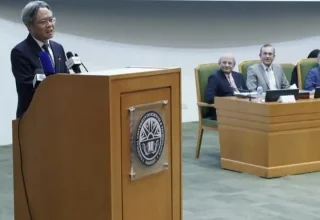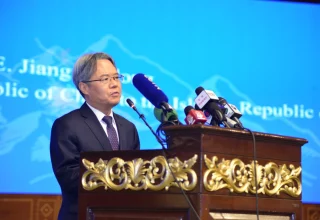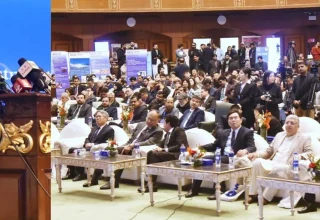
The announcement of China’s diplomatic goals for 2024 has manifested that China will give full play to the strategic leading role of head-of-state diplomacy and make every effort to ensure the success of events including the Forum on China-Africa Cooperation, the Boao Forum for Asia, the China International Import Expo and the Forum on Global Action for Shared Development in the current year.
It has become obvious that China’s diplomacy with neighboring countries is a priority in its diplomatic agenda. Since the founding of the People’s Republic of China (PRC), Chinese governments have attached great importance to diplomacy with their neighbors and the international community. Guided by the policy of good neighborliness and friendliness they have developed a series of important strategic ideas and policies to initiate a generally favorable environment for China’s modernization.
Since its reform and opening up, the rapid growth of China’s economy, and the rise of its international status, China’s diplomacy with neighboring countries has featured more prominently in China’s overall diplomacy. After entering the new century, the Chinese government formally proposed that the development of its relationship with neighboring countries and the international community should top China’s diplomatic agenda. Whether it is in terms of geographical location, natural environment, or mutual relations, diplomacy with neighboring countries is of extremely important strategic significance to China.
Since the 18th Communist Party of China (CPC) National Congress, while maintaining the consistency and stability of diplomatic policies and principles, China has made comprehensive arrangements for its overall diplomacy, highlighting the important role of neighboring countries in China’s overall development and diplomacy.
In November 2014, the Foreign Affairs Work Conference held by the CPC Central Committee emphasized diplomacy with neighboring countries and made it the top priority of China’s diplomatic strategic arrangements. At the 19th CPC National Congress, it was underlined that China will deepen relations with its neighbors by the principles of amity, sincerity, mutual benefit, and inclusiveness, and the policy of forging friendship and partnership with its neighbors.
China remains firm in its commitment to forging a new form of international relations featuring mutual respect, fairness, justice, and win-win cooperation, and to working to build a community with a shared future for humanity.
China’s good-neighborly diplomacy stems from the tradition of loving peace and opposing aggression. Since ancient times China has upheld integrity and good neighbourliness and has been willing to treat neighbouring countries in friendly terms. Having good relations with neighbors and friendliness, in general, are deeply rooted in Chinese cultural tradition.
Mao Zedong and other first-generation CPC leaders laid the ideological foundation for new China’s good-neighborly foreign policy. Good-neighbourly diplomatic ideology is mainly reflected in two aspects: first, regardless of their size or power, all countries are equal. This is a diplomatic principle established by Mao Zedong which serves as the ideological source for modern China in promoting good-neighbourly foreign policy. Second, seeking common ground while setting aside differences is also important.
At the Bandung Conference in 1955, on behalf of the PRC, the then Premier Zhou Enlai, together with the leaders of other Asian and African countries, jointly advocated the Bandung Spirit, which is the pursuit of peaceful co-existence and seeking common ground while setting aside differences. This is an example of China’s good-neighborly diplomatic ideology and policy in practice, contributing to the harmonious co-existence between modern China and its peripheral countries. Since the reform and opening up, and in particular, after the Cold War, China’s new generation of leaders has insisted on good-neighborly relations and friendliness to develop a favorable environment with its neighbors for China’s modernization drive and to serve as a guideline for resolving disputes with neighboring countries.
Since the beginning of the 21st century, China has been upholding the policy of forging friendship and partnership with its neighbors, and of fostering an amicable, stable, and prosperous neighborhood, which enriches the connotations and measures of the diplomatic thinking of promoting friendship and partnership with its neighbors.
The Report of the 18th National CPC Congress highlighted that China would remain committed to good-neighborly diplomacy and stressed that China would work hard to develop itself to bring even more benefits to its neighbors. This policy has set the course for China’s good-neighborly diplomacy and field diplomacy. At the conference on diplomatic Work with neighboring Countries held on October 24, 2013, President Xi Jinping emphasized that the basic principle of China’s diplomacy with its neighboring countries was that China would always pursue friendship and partnership with its neighbors and seek to bring friendship, security, and common prosperity to its neighborhood’, thus stressing the concepts of ‘intimacy, sincerity, mutual benefit and inclusiveness’. ‘Intimacy’ here means that China is committed to good-neighborly relations, friendliness, and mutual assistance and that China attaché importance to equality and sincerity, frequently engaging with its neighbors. In addition, China will act more kindly and positively towards neighboring countries to strengthen friendships and gain more recognition and support from them to enhance China’s accessibility, appeal, and influence.
Sincerity refers to the sincere treatment of neighboring countries to attract more friends and partners. ‘Mutual benefit’ means to base China’s cooperation with neighboring countries on mutual benefit, to develop closer networks of common interests, and drive the convergence of mutual interests, so that neighboring countries can benefit from China’s development, and China, in turn, can also benefit from the common development of neighboring countries. ‘Inclusiveness’ refers to the notion of being accommodative. China emphasizes that the Asia-Pacific is large enough to accommodate the common development of all nations in the region and that China will promote regional cooperation with a more open and positive attitude. These new diplomatic concepts proposed by Xi Jinping have become the guidelines for China’s diplomatic policy-making and practice.











































